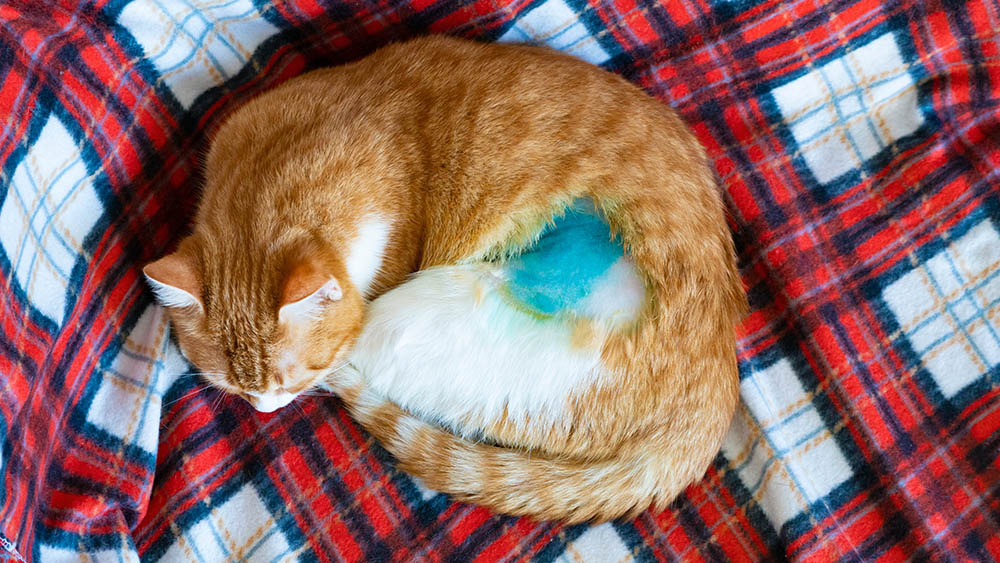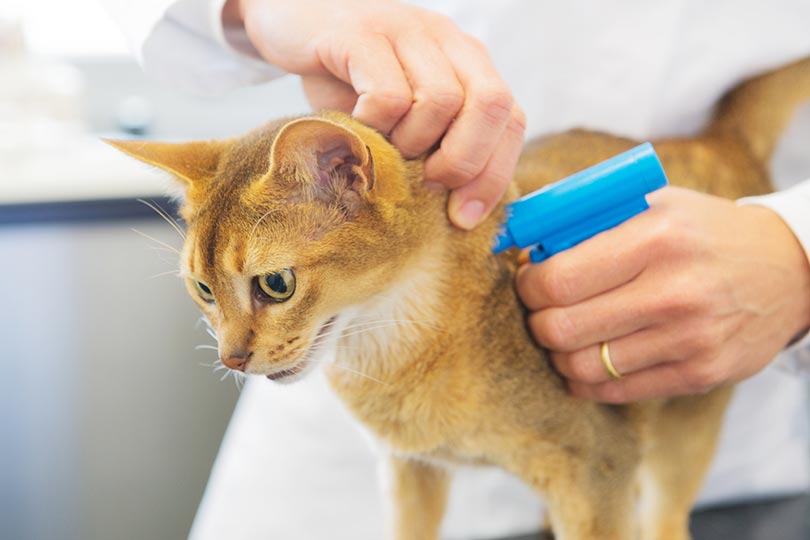VET APPROVED

The information is current and up-to-date in accordance with the latest veterinarian research.
Learn more »Click to Skip Ahead
What You Can Do to Increase the Chances That Your Cat Will Come Back
Do Cats Remember Where They Live?
Do Cats Have a Sense of Direction?
Dangers of Letting Cats Outside
Ways to Safely Let Your Cat Experience Nature
Outdoor Cats’ Impact on Local Wildlife
Importance of Spaying and Neutering Indoor/Outdoor Cats
Pros and Cons of Letting Your Cat Outdoors
What Should You Do If Your Cat Doesn’t Come Home When Called?
Other FAQs About Letting Cats Outside
Cats have been domesticated for thousands of years and are beloved companions to many. They bring us joy, comfort, and love. However, they also like to try to channel their wild ancestors and want to be let outside, or even sneak outside, as much as possible. One common question that comes up with cats is whether they will return home after being let outside.
The short answer is that it depends on the individual cat; most cats will come back when they are let out, although perhaps not at the exact time you would like them to. This article will explore the different factors that influence cats’ likelihood of returning home as well as what you can do to ensure your cat returns when you let them out.

Factors That Impact Whether Your Cat Will Come Back
1. Their Outdoor Experiences
If your cat has had positive experiences outdoors in the past, they will be more likely to come back after being let out. Especially if your cat is used to going in and out of the house on a regular basis, they are more likely to come back, especially as they start to get hungry or miss you. Cats can recognize their home by sight and smell, and tend to return eventually. However, a stray or feral cat that you’ve brought into your home may not come back if let outside because they may be used to fending for themselves instead of relying on you to take care of them.

2. Territory
Cats naturally mark their territory using scent glands on their bodies as well as urine. Cats have exceptional noses, which helps them to return to areas in which they can smell their own scent, such as your home. However, again with feral and stray cats that may have marked a different territory, some cats may be reluctant to leave a familiar area even if it is far from home.
3. Your Cat’s Personality
Some cats are adventurous and love exploring new places while others are content with staying close to home. The more adventurous your cat is, the farther away from home they tend to roam. However, many house cats will at least stay in the neighborhood and will return home when they get hungry or are tired. If your cat adventures too far from home though, they may not be able to find their way back as easily.

4. Age
Younger cats are more likely to explore and wander than older cats, so they may not come back as quickly or easily if let out. Kittens and younger cats may also not be as familiar with what is considered their home, and may not know how to return home. Note that kittens and young cats are also more likely to get injured or killed outside. It’s very important that if you choose to let your cat outside, not to do so until they are older to better increase their chances of returning home.
5. Spayed or Neutered
Adult cats that are not neutered or spayed are more likely to want to go outside in order to find a mate, especially if your female cat is in heat or your male cat senses a female cat in heat outside. Unaltered cats may also be more likely to roam farther away and be gone for longer than cats that are neutered or spayed.
If you have questions about the benefits of spaying and neutering cats, we suggest speaking with a veterinarian.


What You Can Do to Increase the Chances That Your Cat Will Come Back
1. Make Sure Your Cat Is Spayed/Neutered
An unaltered cat is much more likely to wander off in search of a mate. Spaying and neutering your cat will reduce their desire to go looking for one.
2. Provide Your Cat with a Microchip and a Collar & Identification Tag
In case your cat does wander off, having them microchipped and an identification tag on their collar can help you locate them quickly and increase the chances that someone who finds your cat will locate you.

3. Make Sure Your Cat Knows Its Name and Comes When Called
Use your cat’s name frequently indoors so that it learns to recognize it. Use the same name to call your cat. This can help you locate them if they wander off from home. They’ll also recognize their name or at least the sound of your voice, which can help them find their way back home if they wander too far away.
4. Don’t Let Your Cat Out Unsupervised
If possible, it is best not to let your cat out unsupervised. Keeping them on a leash or keeping a constant eye on them can help you ensure that they come back home safely.


Do Cats Remember Where They Live?
Your cat may not know your address, but they do have a general sense of where they live. Cats have an excellent sense of smell and hearing, which means they can wander without losing track of where they’ve been. They are also able to recognize their owners’ scent and voice, further helping them find their way home.
Do Cats Have a Sense of Direction?
Cats do have a sense of direction and can remember the route they took to get somewhere. They also use landmarks and other visual cues to orient themselves and retrace their steps back home.
Dangers of Letting Cats Outside
Though some cats may return when let outside, it is important to note that there are many dangers that come with letting cats out. Cats can be injured or killed by cars, other animals, or people. They can also become sick from being exposed to outdoor toxins, poisonous plants, and disease-carrying pests like fleas and ticks.

Ways to Safely Let Your Cat Experience Nature
If you do want your cat to experience the outdoors, there are ways to do this safely. You can start by letting them out in a secure outdoor enclosure such as a catio or supervised on a leash. You can also take them on walks and hikes with you in a cat backpack or carrier so that they can enjoy nature without the risks that come with being unsupervised.
Outdoor Cats’ Impact on Local Wildlife
When you let your cat out, they most likely will hunt and kill wildlife, particularly birds. This can have an impact on the balance of nature, especially if cats are allowed to roam freely. It is important to consider this when deciding whether to let your cat outside. Cats killing wildlife such as birds and mice can also increase their chances of getting an illness, parasites, or worms.
Importance of Spaying and Neutering Indoor/Outdoor Cats
Spaying and neutering cats not only reduces the chances of your cat wandering away, but it can also help reduce the number of stray cats in your area. It also helps to prevent unintentional breeding, which can lead to unwanted litters of kittens. Without intervention, just one single female can have as many as 100 kittens in her lifetime.

Pros and Cons of Letting Your Cat Outdoors
The decision to let your cat out is a personal one and depends on both your lifestyle and the individual cat.
- Giving them the chance to explore nature
- Allowing them to exercise
- Hunting/mental stimulation
- Reducing stress
- Their impact on local wildlife
- They may get lost or not come back home when called
- They may be exposed to illness or toxic substances
- They may be hit by a car
- They may be attacked by another animal
What Should You Do If Your Cat Doesn’t Come Home When Called?
The first step is to check your local animal shelters or contact the microchip company if your cat has been chipped. It’s also a good idea to post flyers in your neighborhood and let neighbors know that your cat is missing. Additionally, you can file an online missing pet report with organizations like Found Animals or Missing Pet Partnership.


Other FAQ About Letting Cats Outside
Is It Safe to Let Your Cat Out at Night?
Generally speaking, it is not a good idea to let your cat out at night. This is when predators are most active and cats can be particularly vulnerable.
Should I Let My Cat Outside If They Are Indoor-Only?
Unless your cat has been trained to come when called and they are microchipped, it is not recommended to let an indoor-only cat outside.
How Can I Keep My Cat Safe When Letting Them Out?
Supervise your cat when they are outside and make sure that they are wearing an identification tag with updated contact information. Additionally, keeping your cat up-to-date on vaccinations is important for their health and safety.
Is It Cruel to Keep Cats Indoors?
No, it is not cruel to keep cats indoors. Keeping cats inside in an enriched environment can provide them with a safe and comfortable environment free from hazards like cars, other animals, and disease-carrying pests.
Don’t Cats Have a Natural Instinct to Roam the Outdoors?
Cats do have a natural instinct to explore but they can still be content staying indoors. Providing them with plenty of enrichment and stimulation inside the house can help keep your cat happy and entertained even without access to the outdoors.

How Do I Keep My Cat Away from Dangerous Areas Outside?
Keeping your cat away from dangerous areas is important for their safety. You can provide a secure outdoor enclosure for them to explore in or take them on supervised walks and hikes. Additionally, you can use deterrents like audible alarms, brightly-colored flags, and motion activated sprinklers to keep cats away from off-limit areas.
How Can I Make Sure My Cat Is Seen and Safe When Outdoors?
Making sure that your cat is visible and identifiable when out of the house is important for their safety. You can buy reflective collars with bells attached, along with personalized tags featuring updated contact information. Additionally, having your cat microchipped is an effective way to ensure that they can be identified if they get lost.
Is There a Way to Keep Other Cats Away from My Yard?
Yes, there are several ways to deter cats from entering your yard. You can use motion activated sprinklers or ultrasonic devices that emit sound when cats come near. Additionally, you can install fencing around the perimeter of your property and use deterrents like citronella oil, cayenne pepper, and citrus peels. These methods can help keep cats away while still allowing them to roam in their own space.


Conclusion
Whether or not your cat will come back after being let outside is largely dependent on the individual cat. It is important to consider factors such as their previous outdoor experiences, the area where you live, personality, age, and whether they’ve been spayed or neutered when determining how likely they are to return home. Additionally, there are steps you can take to increase the chances that your cat will come back, such as providing them with an identification tag and training them to come when called. Ultimately, if you take the necessary precautions and keep a close eye on your cat while they are outdoors, it can help ensure that they make their way back home safely.
Related Reads:
- Can Indoor Cats Become Outdoor Cats? Tips, Risks & Alternative Solutions
- Can Outdoor Cats Become Indoor Cats? Facts & Transitioning Tips
Featured Image Credit: Sa Ka, Pixabay












